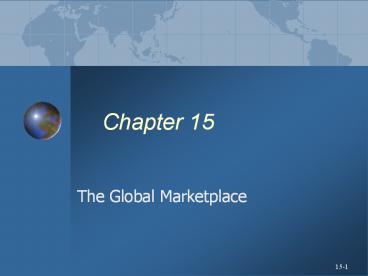The Global Marketplace
Title:
The Global Marketplace
Description:
15-1. Chapter 15. The Global Marketplace. 15-2. Road Map:Previewing the Concepts ... trade is booming and now accounts for a quarter of the United States' GDP. ... –
Number of Views:1334
Avg rating:3.0/5.0
Title: The Global Marketplace
1
Chapter 15
- The Global Marketplace
2
Road MapPreviewing the Concepts
- Discuss how the international trade system,
economic, political-legal, and cultural
environments affect a companys international
marketing decisions. - Describe three key approaches to entering
international markets. - Explain how companies adapt their marketing mixes
for international markets. - Identify the three major forms of international
marketing organization.
3
Global Marketing into the Twenty-First Century
- The world is shrinking rapidly with the advent of
faster communication, transportation, and
financial flows. - International trade is booming and now accounts
for a quarter of the United States GDP. - Between 1996 and 2006, U.S. exports are expected
to increase 51. - Global competition is intensifying and few U.S.
industries are now safe from foreign competition.
4
Global Marketing into the Twenty-First Century
- To compete, many U.S. companies are continuously
improving their products, expanding into foreign
markets, and becoming global firms. - Global firms face several major problems
- High debt, inflation, and unemployment have
resulted in highly unstable governments
currencies, - Governments placing more regulations on foreign
firms, - Protectionist tariffs and trade barriers,
- Corruption.
5
McDonalds in Beijing
- Many U.S. companies have long been successful,
including McDonalds, at international marketing. - http//www.mcdonalds.com/
6
Major International Marketing Decisions (Fig.
15-1)
7
Looking at the Global Marketing Environment
The International Trade System i.e. Tariff,
Quota, Embargo, Exchange Control, and Nontariff
Trade Barriers
The World Trade Organization and GATT Treaty
designed to promote world trade by reducing
tariffs and other international trade barriers
Regional Free Trade Zones Group of nations
organized to work toward common goals in the
regulation of international trade
8
Discussion Question
- When exporting goods to a foreign country, a
marketer may be faced with trade restrictions.
Discuss the effects that a tariff might have on
an exporters marketing mix.
9
Economic Environment
Subsistence Economies
Industrial Structure
Types of Industrial Structure
Raw Material Exporting Economies
Industrial Economies
Industrializing Economies
Income Distribution
10
Political-Legal Environment
At Least Four Political-Legal Factors Should be
Considered in Deciding Whether to do Business in
a Given Country
Monetary Regulations
Attitudes Toward International Buying
Government Bureaucracy
Political Stability
11
Cultural Environment
Sellers Must Examine the Following Before
Planning a Marketing Program Within a
Given Country.
12
Deciding Whether to Go International
- Reasons companies might consider international
expansion - Global competitors attacking the domestic market,
- Foreign markets might offer higher profit
opportunities, - Domestic markets might be shrinking,
- Need an enlarged customer base to achieve
economies of scale, - Reduce dependency on any one market,
- Customers might be expanding abroad.
- Most companies do not act until some situation or
event thrusts them into the global arena.
13
Deciding Which Markets to Enter
Define Organizations Marketing Objectives and
Policies
What Volume of Foreign Sales is Desired?
How Many Countries Should the Firm Go Into?
What Types of Countries Should be Entered?
Rank by Market Size Growth, Cost of Doing
Business, Competitive Advantage, Risk Level.
14
Deciding How to Enter the Market (Fig. 15-2)
15
Interactive Student Assignments
- Pair with the student on your left to discuss the
following situation. - Once a company has decided to sell in a foreign
country, it must determine the best mode of
entry. Assume that you were the marketing
manager for Mountain Dew and devise a plan and
pick a mode of entry for marketing your product
in China.
16
Deciding on the Global Marketing Program
Adapted Marketing Mix Adjusts the Marketing Mix
Elements to Each International Target Market.
i.e. Japanese Barbie
Standardized Marketing Mix Selling Largely the
Same Products and Using the same Marketing
Approaches Worldwide . i.e Coca-Cola
17
Five Global Product and Promotion Strategies
(Fig. 15-3)
18
International Pricing
- Companies face many problems in setting their
international prices. - Possibilities in setting prices include
- Charge a uniform price all around the world.
- Charge what consumers in each country could pay.
- Use a standard markup of its costs everywhere.
- International prices tend to be higher than
domestic prices because of price escalation. - Companies may become guilty of dumping when a
foreign subsidiary charges less than its costs or
less than it charges in its home market.
19
Whole-Channel Concept for International Marketing
(Fig. 15-4)
20
Deciding on the Global Marketing Organization
1. Organize an Export Department
2. Create an International Division
3. Become a Global Organization
21
Rest Stop Reviewing the Concepts
- Discuss how the international trade system,
economic, political-legal, and cultural
environments affect a companys international
marketing decisions. - Describe three key approaches to entering
international markets. - Explain how companies adapt their marketing mixes
for international markets. - Identify the three major forms of international
marketing organization.































